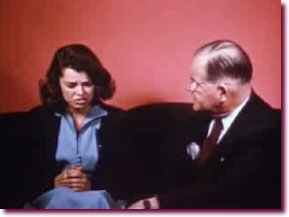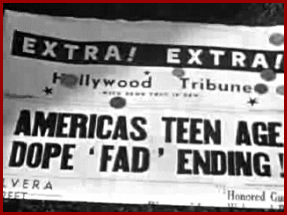Monday, June 9, 2008
Page 7
PERSPECTIVES (Column)
Supervisor’s Lobbying of Colleagues Brings McKesson Unanimous Vote to Fill DA Vacancy
By ROGER M. GRACE
Sixty-Second in a Series
WILLIAM B. McKESSON on Dec. 4, 1956, became the 34th district attorney for Los Angeles County, following unprecedented campaigning and maneuvering in connection with a Board of Supervisors’ appointment to a vacancy in the office.
McKesson, a Los Angeles Superior Court judge, was one of 28 candidates as of a Nov. 14 session of the board at which 23 of the applicants appeared to plead for appointment, as recounted here last time. In the end, he was one of 31 contenders, including Los Angeles Police Chief William H. Parker who had not filled out an application but had acceded to Supervisor Kenneth Hahn’s request to serve, if drafted. The 31 also included one who didn’t legally qualify for the job: non-attorney Tilden W. Johnson, an engineer who had bagged 2 percent of the vote in the June Republican primary for U.S. senator and who was to stage a crackpot write-campaign for president of the United States in 1976.
An Associated Press dispatch on Dec. 4 says that “up to the time the selection was made today there were reports that behind-the-scenes political jockeying was still going on for the job and the time for selection might be postponed.”
One member of the board, John Anson Ford, in his book “Thirty Explosive Years in Los Angeles County,” tells how the decision to appoint McKesson was reached:
Most of the candidates were known to me personally, and I had some intimation as to their policies and predilections. One fact I noticed particularly was that I received no personal calls or supplementary appeals of any kind from McKesson. He stood on his record, which was well known in the Civic Center. He had served as a member of the county counsel’s staff, as a member of the State Youth Authority, and as a superior-court judge. Without so indicating to him, I determined that he was the best candidate for district attorney and set about trying to make him the board’s choice. Supervisor Warren Dorn, I found, preferred another superior-court judge, but that man would not be a candidate. Accordingly Dorn’s promise to vote for McKesson was secured. Supervisor Kenneth Hahn was favorable to McKesson but reluctant to make any promise. Supervisor Burton Chace and Supervisor Herbert Legg each stated that he had another favorite candidate. This was one of the very few occasions in my twenty-four years as supervisor that I lobbied for votes.
When the morning came for selection of district attorney in the open board meeting, I felt some anxiety but was reasonably sure that I had Hahn’s vote, thereby giving McKesson the necessary majority. Apparently the two holdout supervisors had intimations that their candidates could not win. Our very able and conscientious clerk, Gordon T. Nesvig, announced that the selection of a district attorney was the first order of business and that nominations would be called for, the supervisors being polled according to the numbers of their respective districts. This meant that Supervisor Legg’s name would come first on the roll call. He surprised his colleagues by naming William B. McKesson instead of his favorite. Of course Hahn’s, Ford’s, and Dorn’s votes followed suit, and Supervisor Chace joined in to make the selection unanimous.
Legg’s “favorite” had been Chief Deputy Attorney General William V. O’Connor, who, at the outset of the competition (following the death of incumbent S. Ernest Roll on Oct. 26), was seen by the state Democratic Party, to which Legg held allegiance, as a rising star. However, retarding O’Connor’s chances were reports in the Los Angeles Examiner linking him to business dealings with an ex-convict.
Chace’s “favorite” was U.S. Attorney Laughlin E. Waters of the Central District of California (and later a District Court judge here). The Pasadena Star News’ report that night of the board’s action says: “In putting the name of Waters out of consideration, Supervisor Chace praised the U.S. official as ‘young and vigorous and a fearless career man in government.’ ”
The article notes:
“Dorn said that his top list of candidates included McKesson, Waters, Atty. John J. Irwin whom he called ‘a man of integrity,’ William P. Gray, president of the Los Angeles Bar Assn., and Municipal Judge Evelle J. Younger.”
Irwin—a Democrat who supported Republican Gov. Earl Warren for reelection in 1950—had served as an assistant U.S. attorney here, as a deputy mayor of the City of Los Angeles, and as president of the city’s police commission. Gray went on to become a U.S. District Court judge in Los Angeles. Younger was to serve as a Superior Court judge, Los Angeles district attorney, and state attorney general.
In the past, decisions on appointing DAs were made, as is lawful, behind closed doors and then announced publicly. The board had proclaimed that this time, the determination would be at the open session. The Times, the morning after the vote, called into question whether that had actually happened, saying:
“McKesson, 61, summoned as the votes were cast, appeared promptly to receive the oath of office from County Clerk Harold J. Ostly. The jurist was accompanied by his wife Florence, his son Ben and the latter’s family.
“This fact supported reports current the last few days that the Supervisors’ selection had been agreed on before the session opened.”
![]()
McKesson had been born in Kansas on June 24 1895, graduated from Colorado College in 1917, went into the Army, earned his law degree at USC, engaged in law practice with his father, and then served in the County Counsel’s Office.
The blue-eyed, brown-haired attorney had been a Republican, until drawn into the Democratic Party during the FDR Administration.
He gained appointment to the Los Angeles Superior Court on March 3, 1944, resigned Dec. 1, 1945 in order to become a member of the California Youth Authority, and on Nov. 7, 1947 was reappointed to the bench.
From January, 1951 to February, 1952, McKesson was presiding judge of the Juvenile Court.
In that capacity, he assisted in the preparation of short educational films aimed at stemming juvenile delinquency. He appeared in a 1951 documentary, the “Terrible Truth,” in which he talks with an erstwhile teenage addict on the horrors she had encountered while using drugs.

Scene from 'Terrible Truth'
At the end, McKesson declares:
“Some say that the Reds are promoting drug traffic in the United States to undermine national morale. They did it in China a few years back. It’s certainly true that the increase in the use of narcotics plays right into their hands. But why not show everybody, including ourselves, that young American men and women have to make such a stupid, ghastly, tragic mistake? Let’s make tomorrow’s headlines read like this:”

Upon assuming the duties of district attorney, he took over from Adolph Alexander who had been the acting-DA since Roll resigned a few hours before his death. Alexander, who had applied for appointment by the board and garnered no support, did not give up on becoming district attorney...as McKesson would learn.
![]()
McKesson was obliged to come before voters in 1958, but was unopposed. In 1960, however, he drew one opponent: Alexander—now Judge Alexander. Two years earlier, he had been elected to the Beverly Hills Municipal Court.
The June 5, 1960 issue of the Van Nuys News reports that Alexander had accused the incumbent of “a flagrant violation of the relationship between the district attorney and the Grand Jury.”
The McKesson campaign, he complained, had sent letters to former members of the Grand Jury seeking their support. Alexander thundered:
“The district attorney is the legal adviser to the Grand Jury. As such he enjoys the usual privileges of the lawyer-client relationship. To invade this relationship with a direct political appeal does harm to the very nature of the independent Grand Jury system.
“I strongly urge the State Bar of California to make an immediate investigation of this matter and to make preliminary report before the election so that the voters can determine if they want to impose their own judgment on the perpetrators of this action.”
Four of the five supervisors who had voted to appoint McKesson backed their choice in the 1960 election. Legg had, by then, died.
The May 8, 1960 issue of the Times quotes Ford as remarking:
“McKesson has achieved such success in office that it not only is a model studied by other communities, large and small, across the country, but its vigorous prosecution and efficiency, as well s complete cooperation with all law enforcement officials, has done much to keep organized crime out of Los Angeles County.”
A March 15 editorial in the Times describes McKesson as “exceptionally qualified” for the post he held, then mentions that there had been “a few serious mistakes” by him as DA without specifying them, and concludes with the lukewarm accolade:
“He has been a good district attorney. He holds a good office. He should, in the public interest, be retained.”
McKesson handily defeated the challenger.
![]()
His administration was spotless. In 1961, McKesson even sought an indictment of one of his own deputies, one J. Patrick Conroy…who promptly resigned from the office.
As quoted in the Long Beach Independent on Dec. 6, McKesson had announced the previous night that he would seek charges against Downey Municipal Court Judge Lynn Johnston and “three other persons associated with his court, one of them my own deputy.”
Just one day before that, Johnston had been acquitted on three counts of soliciting bribes, with a hung jury on a fourth count. The judge had allegedly offered leniency to attractive female defendants in exchange for sexual favors. Conroy, his courtroom calendar deputy, was a witness on his behalf at the trial.
The Grand Jury began an examination of new charges on Dec. 13. Prior to testifying before that body, a witness told reporters that she had dated both the judge and Conroy after she had been convicted of a traffic offense and fined, the Dec. 14 issue of the Times reports. When arrested on a later unrelated charge, she reportedly told police when they noted that the fine hadn’t been fully paid that she had made private “arrangements” with Johnston by which it would be satisfied.
In the end, Conroy wasn’t indicted and McKesson dropped charges against Johnston in return for his resignation from office. Conroy resigned from the State Bar in 1993 with charges pending, based on a recent conviction.
In 1962, McKesson unsuccessfully sought a statewide office. Two years later, he opted not to run again for district attorney…but was heavily involved in the election that year, backing his chief deputy, Manley Bowler. I’ll get to that in the next column.
![]()
FOOTNOTE: Of the 31 contenders for the post of district attorney in 1956, only one, Baldo Kristovich, 93, is still alive. Kristovich, a lawyer since 1938, was a deputy county counsel at the time he made his bid for the appointment. In 1960, he did gain an appointment from the Board of Supervisors, as Los Angeles County public administrator/guardian.
He remained in that office until 1971. Some of his free-wheeling practices, though well-intentioned, got him into some, well, difficulties. All that is long behind him.
Kristovich still maintains a law practice. A daughter, Marlene Kristovich, is a Los Angeles Superior Court judge and his son, Thomas, is a retired lawyer.
Copyright 2008, Metropolitan News Company